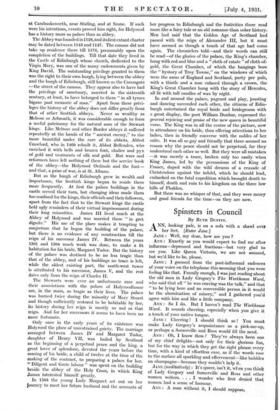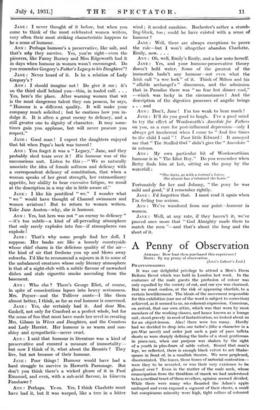Spinsters in Council
By RUTH DUFFIN. ANN, looking pale, is on a sofa with a shawl over her feet. [Enter Jane.] JANE : Well, my dear, how are you ?
ANN : Exactly as you would expect to find me after influenza—depressed and fractious—but very glad to see you. Like Queen Victoria, we are not amused, but we'd like to be, please.
JANE: I guessed from the post-influenzal cadences of your voice on the telephone this morning that you were feeling like that. Funnily enough, I was just reading about the old man in Lady Gregory's The Workhouse Ward, who said that all "he was craving was the talk," and that "to be lying here and no conversible person in it would be the abomination of misery," and I gathered you'd agree with him and like a little company.
ANN: So I do. But I haven't read The Workhouse Ward. It sounds cheering, especially when you give it a touch of your native tongue.
JANE: Cheering ! I should think so ! You must make Lady Gregory's acquaintance as a pick-me-up, or perhaps a Somerville and Ross would fill the need.
ANN: Oh, I know them ! They've always been one of my chief delights—not only for their glorious fun, but for the way in which they get the right phrase every time, with a kind of effortless ease, as if the words rose to the surface all sparkling and effervescent—like bubbles on champagne—because they couldn't help it.
JANE (meditatively): It's queer, isn't it, when you think of Lady Gregory and Somerville and Ross and other women writers. . . . I wonder who first denied that women had a sense of humour.
ANN A man -without it, I should suppose; JANE: I never thought of it before, but when you come to think of the most celebrated women Writers, very often their most striking characteristic happens to be a sense of humour.
ANN: Perhaps humour's a preservative, like salt, and that's why they survive. Yes, you're right—even the piOneers, like Fanny Burney and Miss Edgeworth had it in days when humour in women wasn't encouraged. Do you remember Gregory's Father's Legacy to his Daughters"?
JANE: Never heard of it. Is he a relation of Lady Gregory's ?
ANN: I should imagine not ! Do give it me ; it's on the third shelf behind you—thin, in tooled calf. . . .
Yes, here's the place. After warning women that wit is the most dangerous talent they can possess, he says, "Humour is a different quality. It will make your company much solicited ; but be cautious how you in- dulge it.. It is often a great enemy to delicacy, and a still greater one to dignity of character. It may some- times gain you applause, but will never procure you respect."
JANE Good man I expect the daughters enjoyed that- bit when Papa's back was turned !
ANN: You forget it was a "Legacy," Jane, and they probably shed tears over it ! His humour was of the unconscious sort. Listen to this :—" We so naturally associate the idea of female softness and delicacy with a correspondent delicacy of constitution, that when a woman speaks of her great strength, her extraordinary appetite, her ability to bear excessive fatigue, we recoil at the description in a way she is little aware of."
JANE: I like his pontifical "we." I wonder what " we " would have thought of Channel swimmers and women aviators ! But to return to women writers. Take Jane Austen—why, she is humour.
ANN: Yes, but hers was not "an enemy to delicacy" —it's too subtle—a kind of all-pervading atmosphere that only rarely explodes into fun—if atmospheres can explode !
JANE: That's why some people find her dull, I suppose. Her books are like a homely countryside whose chief charm is the delicious quality of the air— the kind of air that freshens you up and blows away cobwebs. I'd like to recommend a sojourn in it to some of the unbalanced creatures whose only literary atmosphere is that of a night-club with a subtle flavour of unwashed dishes and stale cigarette smoke ascending from the basement.
ANN: Who else ? There's George Eliot, of course, in spite of conscientious lapses into heavy seriousness. Mrs. Poyser—and the Tulliver aunts—I like them almost better, I think, as far as real humour is concerned.
JANE: Yes, she certainly had it. And dear Mrs. Gaskell, not only for Cranford as a perfect whole, but for the sense of fun that must have made her revel in creating Mrs. Gibson in Wives and Daughters, and the Countess and Lady Harriet. Her humour is so warm and sun- shiny and sympathetic—never cruel.
ANN: I said that humour in literature was a kind of preservative and ensured a measure of immortality— but now I think of it, what about the Brontës? They live, but not because of their humour.
JANE: Poor things ! Humour would have had a hard struggle to survive in Haworth Parsonage. But don't you think there's a wicked gleam of it in Paul Emanuel, and even, with a sub-acid flavour, in Ginevra Fanshawe ?
ANN: Perhaps. Ye-es. Yes, I think Charlotte must have had it, but it was warped, like a tree in a bitter wind ; it needed sunshine. Rochester's rather a stumb- ling-block, too ; could he have existed with a sense of humour ?
JANE: Well, there are always exceptions to prove the rule—but I won't altogether abandon Charlotte. Emily, now. . . .
ANN: Oh, well, Emily's Emily, and a law unto herself. JANE: Yes, and your humour-preservative theory • doesn't hold water. Some of the greatest of the immortals hadn't any humour—not even what the Irish call "a wee lock" of it. Think of Milton and his "affable archangel's" discourses, and the admission that in Paradise there was "no fear lest dinner cool," —which was lucky in the circumstances I And the description of the digestive processes of angelic beings . . and ANN: Don't, Jane ! I'm too weak to bear much !
JANE: It'll do you good to laugh. I've a good mind to try the effect of Wordsworth's Anecdote for Fathers on you, as a cure for post-influenzal depression—only I always get incoherent when I come to "And five times to the child I said " I Poor little Edward 1 It annoyed me that" The Stuffed Owl" didn't give the" Anecdote" in extenso.
ANN: My own particular bit of Wordsworthian humour is in " The Idiot Boy." Do you remember when Betty finds him at last, sitting on the pony by the waterfall :
"She darts, as with a torrent's force; She almost has o'erturned the horse."
Fortunately for her and Johnny, "the pony he was mild and good," if I remember rightly.
JANE: I'd forgotten that. I must read it again when I'm feeling too serious.
ANN: We've wandered from our point—humour in women.
JANE: Well, at any rate, if they haven't it, we've proved once more that "God Almighty made them to match the men "—and that's about the long and the short of it.











































 Previous page
Previous page